|
|
|
Sort Order |
|
|
|
Items / Page
|
|
|
|
|
|
|
| Srl | Item |
| 1 |
ID:
176484
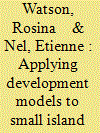

|
|
|
|
|
| Summary/Abstract |
Small island developing states (SIDS) face unique developmental challenges, not least their often narrow economic structure and dependence on a narrow range of economic activities. In this regard migration, remittances, dependence on aid, tourism and state employment feature prominently. This paper explores the nature of Niue's economy and the degree to which its economy depends on tourism and government services, both of which are supported through aid programmes. The limited dependence on remittances places Niue, as a SIDS, into the relatively narrow band of TOURAB states (those dependent on aid, tourism and bureaucracy). Understanding the nature of Niue's economy helps clarify the challenges the country faces, its development needs and the considerations which donors need to focus on through their support. It also clarifies how Niue should position itself relative to market opportunities and what the focus of development strategies should be.
|
|
|
|
|
|
|
|
|
|
|
|
|
|
|
|
| 2 |
ID:
176478


|
|
|
|
|
| Summary/Abstract |
This paper, by looking at the role of Taiwanese citizens in civic organisations for marriage migrants, explores how women's agency and negotiation occur not only against masculine dominance within patriarchal family arrangements, but also in alliance with it, when oppression is located somewhere beyond the family. In contrast to literature that depicts marriage migration as a women's and migrants' issue, this paper explores the role of Taiwanese citizens (often husbands in cross‐border marriages) in shaping the evolution of the phenomenon in both the private and public spheres. The aim of this paper is to fill a gap in empirical literature on marriage migration in Taiwan and East Asia, as well as contribute to feminist debates on women's agency in the context of masculine dominance. Building on ethnographic data collected through fieldwork in Taiwan, including in‐depth interviews and participant observation within civil society organisations for marriage migrants, this paper reveals how Taiwanese male citizens and Chinese female migrants responded to the challenges brought by their decision to engage in cross‐border unions by creating a new narrative that could explain their condition of shared oppression and by developing joint actions to address the structural discrimination they faced as cross‐border couples in Taiwan.
|
|
|
|
|
|
|
|
|
|
|
|
|
|
|
|
| 3 |
ID:
176480


|
|
|
|
|
| Summary/Abstract |
After a first labour migration from the countryside to the city in China, some Chinese migrant working women are engaged in marriage migration to Taiwan. There, they face social, gendered and economic subalternity. Therefore, some women divorce and re‐migrate to China, to the city they had been previously working in, where they remobilise social, economic and emotional resources, as well as the new competences and knowledge capitalised during mobility experiences in China and Taiwan. They oscillate between new local and global scales, and generate creative social, economic and emotional connections among spaces, places and people. Mobilities take the shape of physical and virtual, material and emotional ‘orbits’, connecting diverse spatialities, temporalities and affections. Drawing on a multi‐situated global ethnographic work tracking women's migrations from China to Taiwan and from Taiwan to China, this article contributes to the study of physical and virtual, material and emotional mobilities of migrants in a globalised social world of interconnection and hypermobility. It provides insights to apprehend, theoretically, methodologically and empirically, the link between mobilities, emotions the digitalisation of social and economic practices. Navigating through spatialities, temporalities and emotions, Chinese women produce ‘in‐between’ cosmopolitan biographies inside mutating and fluid local and global, physical and virtual, spaces. Mobilities take an orbital shape, embedded in social and affectional relations, economic practices, and emotions.
|
|
|
|
|
|
|
|
|
|
|
|
|
|
|
|
| 4 |
ID:
176482


|
|
|
|
|
| Summary/Abstract |
Two theoretical frameworks frame the spatial dimensions of organised crime. The first, which has shaped international responses to the problem, stresses the scalar and territorial nature of the problem; the second (and recently emerging) has drawn on network theories to suggest that organised crime is ascalar and operates through fluid relationships between people, places and things. We suggest that these viewpoints tend to bifurcate scalar and flat ontologies and argue that understanding and responding to organised crime requires engaging with theories of scale and networks simultaneously. We bring this theoretical insight to bear on a case study: we examine the way state power has shaped organised crime and responses to it across the Pacific. The case study highlights that responses to organised crime are by and large driven by scalar and state‐based responses, which have been shaped by political power. In contrast, organised crime constitutes networked relations that are significantly shaped by administrative and political scales. The paper argues that the disjuncture between the nature of responses to organised crime helps perpetuate the problem. It also highlights the advantages of greater dialogue between scalar and networked theories of organised crime.
|
|
|
|
|
|
|
|
|
|
|
|
|
|
|
|
| 5 |
ID:
176485


|
|
|
|
|
| Summary/Abstract |
Faced with the pressing challenges of poverty, climate change and disasters, identifying opportunities for interventions that offer positive outcomes across the trifecta of development, adaptation and disaster risk reduction is critically needed. While the overlaps between these streams can be straightforward in theory, practical opportunities for convergence are often lacking. Drawing on 10 focus groups with women market vendors who are part of the UN Women's Markets for Change programme in Vanuatu, this paper explores how markets as places can be useful entry points for this trifecta. Marketplaces can be important sites for developing capabilities and empowering women. As transient and interactive spaces, marketplaces also have inherent strengths that can be built upon and utilised to heighten intervention reach and foster positive outcomes across the development‐adaptation‐disaster trifecta. This paper encourages further exploration into the capacity of marketplaces to achieve this trifecta of outcomes across various scales and locations, and to find solutions to existing challenges.
|
|
|
|
|
|
|
|
|
|
|
|
|
|
|
|
| 6 |
ID:
176483
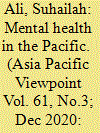

|
|
|
|
|
| Summary/Abstract |
The Pacific region faces a significant and growing burden of noncommunicable diseases and mental disorders. An emerging issue is the increasing overlap between physical and mental health conditions, which are often the result of interactive effects and lead to more severe consequences. In addition, climate change is amplifying health risks, as it poses both physical and existential threats to Pacific Island communities. The sustainable development agenda provides a holistic opportunity to address these issues; key elements include improving health surveillance and strengthening health systems, within a multisectoral approach, in order to work towards achieving Healthy Islands.
|
|
|
|
|
|
|
|
|
|
|
|
|
|
|
|
| 7 |
ID:
176481
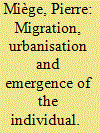

|
|
|
|
|
| Summary/Abstract |
The emergence of the individual is one of the most profound and significant evolutions of Chinese society that has accompanied economic reforms since the late 1970s. Existing research frequently uses a dual concept of ‘individualist’ versus ‘collectivist’ societies to approach the lives of urban Chinese. In the case of same‐sex attracted persons, as they often hide their sexual orientation in most of their social life and must respect social norms of filial piety and marriage, it is easy to conclude that today's urban China continues to be primarily a ‘collectivist’ society where the individual remains fragile. Using a long‐term ethnography of same‐sex attracted migrant men who gather in a public park to create a community of friends and invent some shared cultural and social traits, this paper proposes to deepen the analysis by borrowing the distinction between three different attitudes towards individualism developed by Michel Foucault. It will argue that these men actively construct specific spaces where they can live a private life, as well as experiment and explore their self. Therefore, these men display a more complex articulation between some aspects of a ‘collectivist’ ethos and the strengthening of individual traits.
|
|
|
|
|
|
|
|
|
|
|
|
|
|
|
|
| 8 |
ID:
176473


|
|
|
|
|
| Summary/Abstract |
Rapid economic growth in East Asia brings with it not only a development ‘miracle’ but also increased migration within and from China as well as in the Northeast–Southeast Asia corridors. The expanding migration flows make Chinese families in Singapore, Taiwan, mainland China and Hong Kong one of the most noticeable groups whose life trajectory is punctuated by migration. This special issue is a collective endeavour to explore deeply the internal dynamics between Chinese family members across generations in regard to care, production and reproduction in light of the challenges and opportunities brought about by neoliberal globalisation.
|
|
|
|
|
|
|
|
|
|
|
|
|
|
|
|
| 9 |
ID:
176479


|
|
|
|
|
| Summary/Abstract |
This paper centres on analysing how return migrants' participation in online businesses impacts marital power dynamics in rural families alongside the rise of e‐commerce in rural China. During 2016 and 2017, I conducted an ethnographic study in a Chinese ‘Taobao village’ which I have termed ‘Xinyi’ whereby the majority of villagers make their livelihoods by selling furniture via the online marketplace Taobao. The boom of e‐commerce has attracted many migrants to return to the village and start their online businesses. Inquiring into whether and how rural women's increased access to online entrepreneurship challenges the gender norm that upholds male dominance in marriage, I delineate the power relations in ‘Taobao families’ within which rural women jointly operate online shops with their husbands. Drawing from my ethnographic data, I propose a conceptual framework incorporating the lenses of returnee entrepreneurship, flexible inner‐outer boundary and performance of gender to examine discrepancies between the gender norm that upholds gender hierarchy, and the practice regarding the husbands and wives' equal engagements in online merchandising. This framework is developed to shed a more positive light on the nuances of women's exercise of agency that entails nominal conformity to the gender norm.
|
|
|
|
|
|
|
|
|
|
|
|
|
|
|
|
| 10 |
ID:
176474


|
|
|
|
|
| Summary/Abstract |
As the first study on the marital stability of transnational remarriages, this study contributes to two bodies of literature, namely, marriage migration and stepfamilies, by examining the role of stepchildren and common children in (de)stabilising marital relationships in cross‐border stepfamilies in Hong Kong. Studies have shown that intermarriages and remarriages are unstable, especially remarriages involving non‐shared children. Remarriages represent a significant proportion of transnational marriages. However, little is known about the role of immigrant stepchildren and common children at different life courses in shaping marital dynamics and stability in international remarriages. This study focuses on cross‐border marriages that involve children from a previous relationship. It adopts a life course perspective and uses in‐depth interviews with lower‐class mainland Chinese immigrant mothers with children from previous relationships and common children with their Hong Kong husbands. It found that children in these families played three roles in stabilising or jeopardising remarriage: immigrant stepchildren as catalysts, common children as buffers and husband's children as gatekeepers. This study contributes to the literature by highlighting the important role of migration in stepfamily dynamics, the diversity of transnational stepfamilies and the need to go beyond the conjugal dyad to understand marital dynamics and stability in cross‐border stepfamilies.
|
|
|
|
|
|
|
|
|
|
|
|
|
|
|
|
| 11 |
ID:
176475
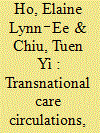

|
|
|
|
|
| Summary/Abstract |
Contrary to the perception that older adults are passive care dependents of their children, some Chinese older adults are becoming primary caregivers in migrant families. Using the case of Chinese older migrants who move temporarily to Singapore for grandparenting duties, this article examines the grandparenting migrants’ contributions to social reproduction through transnational care circulation and underscores how their migratory experience changes their perspectives of intergenerational familial contract. While previous studies on older migrants tend to consider the impacts of welfare support in the migrant‐receiving context, we extend that body of work by integrating analyses of the private sphere with the public sphere across the migrant‐sending and ‐receiving contexts to examine how transformations in both domains impact the grandparenting migrants’ ageing subjectivities. Our findings reveal gradual changes to the intergenerational familial contract in Chinese migrant families. The grandparenting migrants minimise their expectations of intergenerational reciprocity and instead emphasise the well‐being of the next generation and maintaining their autonomy in later life. Their aspiration for independent ageing, we argue, is made possible by the expanded state social protection in the homeland and the realisation that depending on their migrant children for old age care could be impractical and unfavourable for both generations
|
|
|
|
|
|
|
|
|
|
|
|
|
|
|
|
| 12 |
ID:
176476
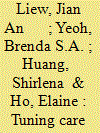

|
|
|
|
|
| Summary/Abstract |
The literature on care relations and eldercare has directed attention towards recognising the interdependence between ‘carer’ (familial caregiver or home support worker) and the ‘cared for’ (the older person). Such an approach gives attention to the contingencies and entanglements that shape the relationships among differently positioned members of care dyads. Drawing on in‐depth and ‘go‐along’ interviews, we examine how relations between migrant caregivers and their non‐migrant elderly charges in Singapore are spatially negotiated – formulated, sustained and reworked – on an everyday basis through Alfred Schütz's framework of intersubjective ‘tuning’. Owing to the unequal ways that migrant caregivers are positioned within Singapore society, moments of positive family‐like regard towards them are almost always preceded/superseded by forms of negativity and vice versa. The employer–employee care dyad is therefore best understood as a relational process that requires constant ‘tuning’, as the elderly employer needs care which no one else will provide, while the employee needs the job in order for the migration gamble to succeed. The paper concludes by drawing together the spatial and temporal insights that the conceptual approach of ‘tuning’ brings to analyses of care relations.
|
|
|
|
|
|
|
|
|
|
|
|
|
|
|
|
| 13 |
ID:
176477


|
|
|
|
|
| Summary/Abstract |
The lives of Southeast Asian caregivers in Taiwan are regulated by a number of laws and policy measures that preclude them from naturalisation, deprive them of a family life, restrict their residency, mobility and employment, and, in the past, have suspended their fertility. They are thus excluded from Taiwanese society and alienated as temporary, supplementary and disposable outsiders in line with broad public opinion. ‘Bringing the state back in’ to its analysis, this article argues that this legislation is not only market‐driven but socio‐politically expedient in that it sanctions the continued employment of foreign caregivers as productive workers rather than as fertile women, while simultaneously casting them as the undesirable other. Taiwan thus becomes a ‘migration state’ with an open economy but a closed national community. Drawing on key government sources as well as longitudinal social surveys, the article demonstrates how this state‐anchored expediency enjoys consistent public endorsement. In focusing on how and why Southeast Asian caregivers' fertility was suspended, it introduces a much‐needed gender perspective to our understanding of how migrant women become ‘disenfranchised class’ in the hostile guest worker system.
|
|
|
|
|
|
|
|
|
|
|
|
|
|
|
|
|
|
|
|
|